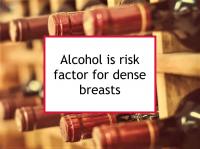Alcohol consumption is associated with increased risk of breast cancer and its recurrence. Consuming even as few as three to six drinks per week increases the risk of breast cancer by 15% compared to not drinking, according to one study. The risk appears to be highest for hormone receptor positive (ER+/PR+) disease and lobular breast cancer.
However, alcohol consumption has also been shown to promote HER2 overexpressing (HER2+) breast cancer development via an estrogen signaling pathway.
Diet and breast density
However, breast density is not fixed—it tends to vary over time and can be increased or reduced as a result of diet and environmental exposures. Red meat, whole milk, and saturated fat consumption have been found to be associated with increased breast density. A high dietary omega-6 to omega-3 fatty acid ratio may also increase breast density. High caloric intake and high consumption of sugar-sweetened beverage or foods also have been linked to increased breast density. Breast density may also be increased by exposure to endocrine disruptors such as cadmium, bisphenol A (BPA), phthalates, and certain pesticides. Hormone replacement therapy (HRT), or menopausal hormone therapy, particularly combined estrogen plus progestin HRT, heightens the risk of breast cancer associated with dense breasts among postmenopausal women.
Note that alcohol does not appear to preferentially reduce survival of women with ER+ disease, suggesting that its role in promoting tumor growth and metastasis differs from its role in promoting breast cancer development. The increased breast cancer risk conferred by alcohol consumption appears to be partially due to increases in mammographic breast density (itself a strong risk factor for breast cancer). Now a new study has reported that alcohol increases breast density most among women who are already at high risk of breast cancer due to other factors.
Olive oil consumption is associated with reduced breast density, as is intake of vitamin D in combination with calcium. High intake of omega-3 fatty acids has been linked to lower breast density in both animal and human studies. While consuming carotenoids does not reduce breast density, it can reduce the risk of breast cancer associated with dense breasts. Women with a reduction in breast density over time have a lower risk of breast cancer than women whose breast density remains stable.
Latest research: Alcohol increases density most in high-risk women
The study referenced at the beginning of this news story was designed to investigate whether the association between alcohol consumption and breast density is influenced by "background" breast cancer risk due to other breast cancer risk factors. The study included 53,060 Swedish women aged 40 to 74. Mammographic breast density was measured using VolparaDensity, a type of software that estimates the volume of dense breast tissue from digital mammograms. The risk of developing breast cancer during the next 10 years was estimated using the Tyrer-Cuzick prediction model, which incorporates multiple breast cancer risk factors. A web-based self-administered questionnaire was used to determine alcohol intake.
Increasing alcohol consumption was found to be associated both with a higher absolute amount of dense tissue—absolute dense volume cm3—and a higher proportion of dense compared to nondense tissue—percent dense volume (%). The association between alcohol intake and absolute dense volume was strongest among women with the highest risk of breast cancer (defined as 10-year risk of 5% or higher). Among such high-risk women, those consuming 5.0 to 9.9 g of alcohol per day (equivalent to three to six drinks per week) had approximately 2.6 cm3 higher absolute dense volume compared to women with no alcohol intake. For intakes of 10.0 to 19.9 g, 20.0 to 29.9 g, and 30.0 to 40.0 g of alcohol per day, the corresponding higher absolute volumes were 2.9 cm3, 4.6 cm3, and 10.8 cm3 compared with abstainers. Increasing alcohol consumption also tended to result in higher absolute dense volume in women with low 10-year breast cancer risk (up to 3%), but not in women with moderate risk (3.0-4.9%).
The authors conclude that alcohol consumption might increase breast cancer risk by increasing mammographic breast density, particularly in women who have other breast cancer risk factors that already put them at high risk for the disease.
Please see our articles on alcohol and breast density for more information.
